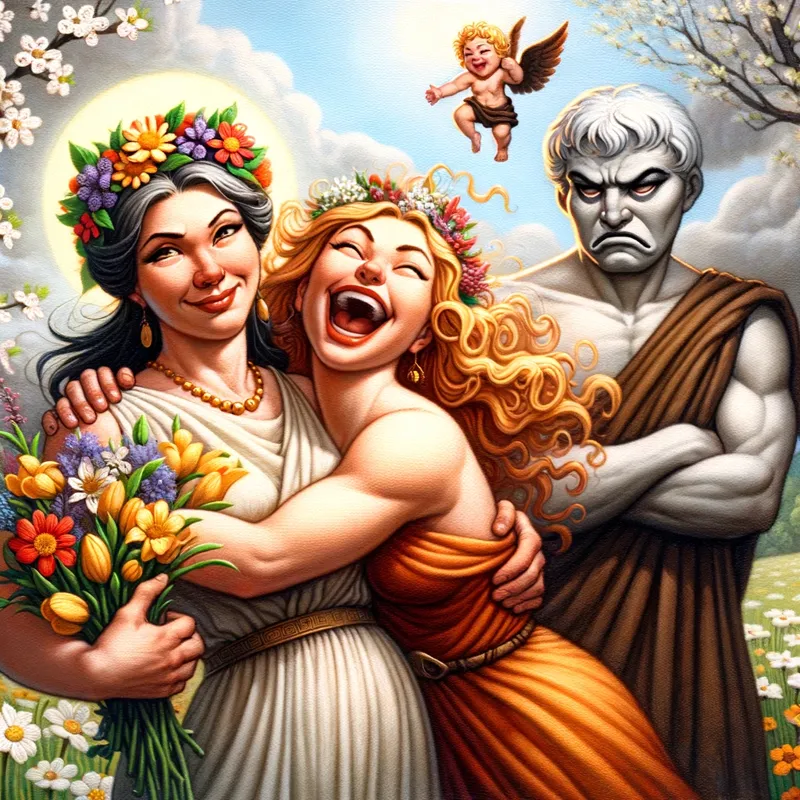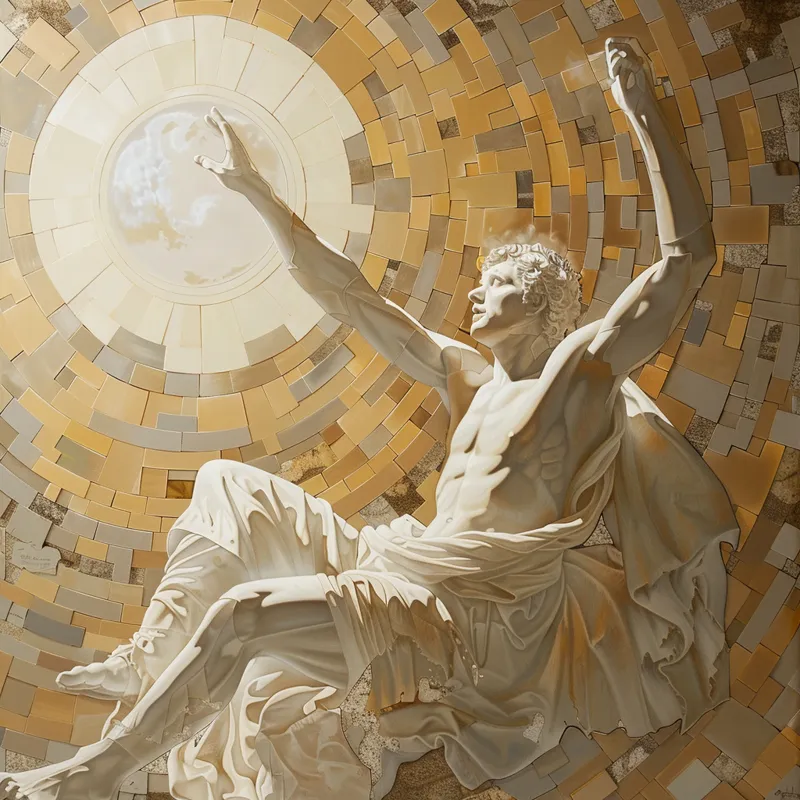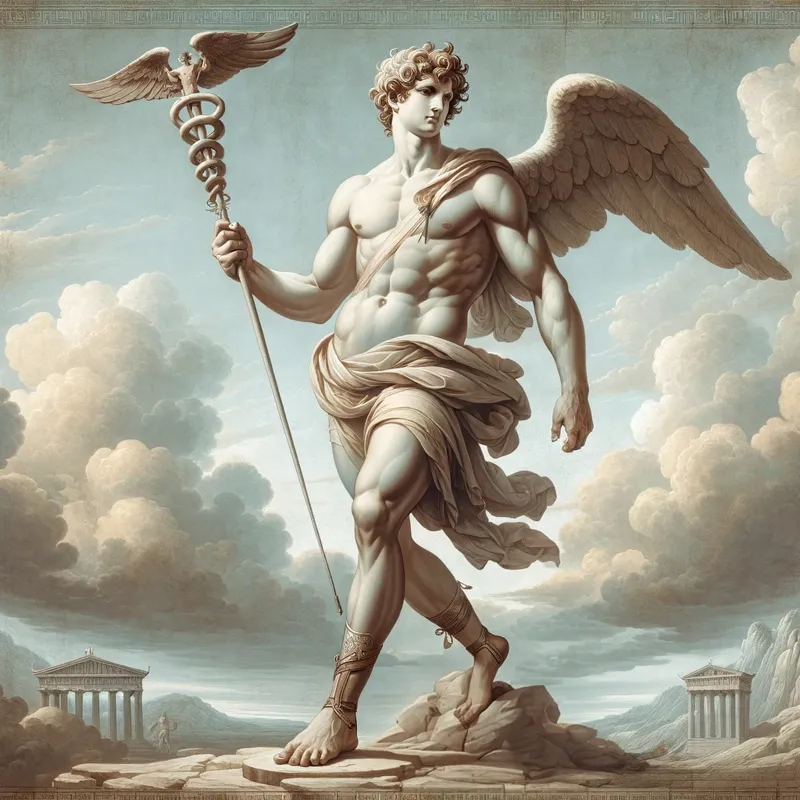
Be my light in darkness
The myth of Demeter, her daughter Persephone, and Hades is a poignant tale that explores themes of love, loss, and the unbreakable bond between a mother and her child. It serves as a cornerstone in Greek mythology, providing an allegorical explanation for the changing seasons and the cyclical nature of life and death. This story not only illuminates the profound depth of familial love but also illustrates the ancient Greeks' attempt to understand the natural world around them.
The Peaceful Life

O Fortuna
Demeter, the goddess of agriculture and fertility, lived a peaceful and contented life with her beloved daughter Persephone. Known for her nurturing nature, Demeter's happiness was bound to the well-being of her daughter, whose innocence and beauty were unparalleled. They spent their days roaming the lush fields and meadows, where Persephone would play, picking flowers and reveling in the beauty of nature, under the watchful and loving eyes of her mother.

The road traveled
This idyllic existence, however, was not to last. The beauty of Persephone caught the eye of Hades, the god of the Underworld. Enamored by her grace and innocence, Hades yearned for Persephone to be his queen, a desire that would soon disrupt the harmony of the natural world and the lives of both mother and daughter.
The Abduction

Soul pearl
One day, as Persephone gathered flowers in a meadow, the earth suddenly split open, and Hades emerged from the chasm in his dark chariot. Before she could react, he seized her and took her with him back to the Underworld. The meadow closed behind them, leaving no trace of the abduction, and Persephone's cries for help went unheard by the other gods.

The wide world

Dangers at the edge
Demeter, upon realizing her daughter was missing, was stricken with unspeakable grief. She roamed the earth in search of Persephone, her sorrow so profound that it touched every corner of the world. As she searched, her neglect of the lands led to barren fields, withering crops, and a great famine that threatened the very existence of humanity.

Shadow walk with me
Demeter's Grief

The frozen heart
Demeter's grief was immeasurable. She withdrew her blessings from the earth, causing an unending winter where nothing could grow. The once fertile lands lay barren, and the people suffered greatly from hunger and the cold. In her despair, Demeter disguised herself as an old woman and wandered the earth, her heart heavy with loss, refusing to return to Olympus or let the earth bear fruit until her daughter was returned to her.

What am I to you and you to me?
The gods, concerned by the plight of humanity and the unyielding sorrow of Demeter, attempted to console her, but to no avail. Demeter's singular focus was the return of Persephone. Her anguish was such that the very cycles of life and death stood still, illustrating the profound impact of her divine sorrow on the natural world.

You are free from death
The Revelation

Vow
Zeus, realizing the severity of the situation and its impact on both the divine and mortal realms, decided to intervene. He sent Hermes, the messenger god, to the Underworld to negotiate Persephone's return. Meanwhile, Demeter's unending search led her to Eleusis, where she revealed her true divine form and was welcomed with honors and promises of a grand temple in her name.

Life and death form a circle
Hades, aware that he could not defy the will of Zeus, agreed to Hermes' terms but not before cunningly offering Persephone a pomegranate. Unaware of the consequences, Persephone ate six seeds, binding her to the Underworld for part of each year. This act ensured that although she would be reunited with her mother, the reunion would only be temporary.

Twilight walker
The Reunion

Reunion
The reunion of Demeter and Persephone was filled with joy and tears. Demeter's happiness at seeing her daughter again was immeasurable, and the earth responded to her renewed spirits. Flowers bloomed, trees bore fruit, and the barren lands once again became fertile. This return of life to the earth was the first spring, a testament to the power of Demeter's love and the joy of her reunion with Persephone.

Cradle of the ancients
However, the joy was tempered by the knowledge that Persephone's stay on the surface would be temporary. She was bound to spend part of the year with Hades in the Underworld due to the pomegranate seeds she had consumed. This arrangement marked the beginning of the seasons, with Demeter's joy bringing spring and summer, and her sorrow bringing autumn and winter during Persephone's absence.
The Balance of Life and Death

What was once shall be again
The cyclical journey of Persephone between the world of the living and the Underworld came to symbolize the balance between life and death, growth and decay. Demeter's powers of fertility and agriculture thrived when Persephone was with her, bringing warmth and abundance. In contrast, her departure heralded a period of decline and withdrawal, reflecting Demeter's mourning.

...my only sunshine
This cycle ensured the continuity of life, teaching humanity about the inevitability of change and the balance inherent in existence. The myth embodied the natural rhythms of the world, with the alternating seasons mirroring the goddesses' joy and sorrow, a poignant reminder of the delicate balance that sustains life.

Truth is the daughter of Time
The myth of Demeter, Persephone, and Hades transcends a mere explanation for the changing seasons, delving deep into themes of maternal love, loss, and the enduring cycle of life and death. It reflects the ancient Greeks' reverence for the natural world and their understanding of the human condition, encapsulated in the divine drama of these Olympian deities. This timeless story continues to resonate, a testament to the enduring power of myth to convey profound truths about the natural world and the human experience.

















